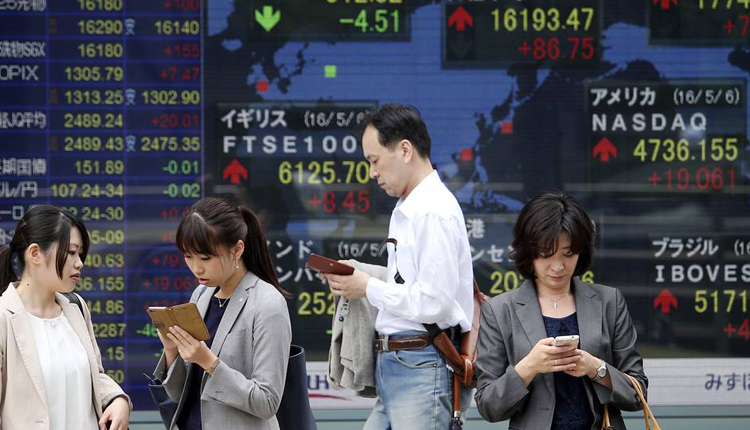Asian stocks gained on Tuesday, taking cues from the rally in U.S. stocks as investors temporarily set aside recent trade-related concerns.
In Japan, the Nikkei 225 advanced 0.85 percent, building on the last session’s 1.2 percent gain. Most sectors traded in positive territory, including banks and exporters. Among heavyweights, Uniqlo-owner Fast Retailing edged up by 0.84 percent while robotics and automation manufacturer Fanuc added 1.42 percent.
Elsewhere, South Korea’s Kospi rose 0.72 percent as steelmakers recovered some losses seen in the last session. Large cap technology names were mixed, with Samsung Electronics tacking on 1.64 percent.
Hong Kong’s Hang Seng Index climbed 0.67 percent, with the energy sector leading gains in the morning. Mainland indexes also tracked slightly higher, extending the sharp gains seen on Monday, with the benchmark Shanghai composite rising 0.13 percent.
Down Under, the S&P/ASX 200 turned lower, giving up early gains to slip 0.18 percent as heavily weighted financials traded in negative territory.
MSCI’s index of shares in Asia Pacific excluding Japan was higher by 0.22 percent during Asia morning trade.
The overall improvement in sentiment came after Wall Street closed sharply higher in the last session, supported partially by the release of expectation-topping June jobs data on Friday. The Dow Jones Industrial Average rose 1.31 percent, or 320.11 points, to close at 24,776.59, posting its best session in more than one month.
Fears that a months-long trade dispute between the U.S. and a number of its trading partners, including China, have kept investors on edge about the implications of a potential trade war affecting global growth and corporate profits. U.S. tariffs on $34 billion in Chinese goods took effect on Friday, with China immediately retaliating with duties on the same amount of U.S. products.
With earnings season ahead, however, trade tensions appear to have dissipated slightly from the spotlight.
“No new news from the U.S.-Sino trade war has helped investors focus back on fundamentals and with the U.S. earnings season starting later this week, the U.S. has led the gains in equities overnight,” Rodrigo Catril, senior foreign exchange strategist at National Australia Bank, said in a note.
Even with the improvement in risk appetite seen so far this week, trade jitters are expected to continue to simmer in the longer term.
“Trade war risk is likely to linger in the background as countries start to introduce measures to prepare for tariffs staying for a potentially longer-than-expected period,” Zhu Huani, an economist at Mizuho Bank, said in a note.
Elsewhere, U.K. Foreign Secretary Boris Johnson has resigned and will be replaced by Jeremy Hunt. That development came after Brexit Secretary David Davis stepped down on Sunday as he had objected to British Prime Minister Theresa May’s EU withdrawal plan.
The British pound remained under pressure amid the political turmoil. The currency traded at $1.3252 at 9:47 a.m. HK/SIN after taking a hit overnight on the resignation news.
The dollar index, which tracks the greenback against a basket of currencies, stood at 94.039.
In individual movers, Yahoo Japan popped 12.78 percent after SoftBank Group said its subsidiary will buy shares worth around 221 billion yen ($1.99 billion), or a 10.78 percent stake, in Yahoo Japan. Those shares are currently held by Altaba.
Meanwhile, Nissan Motor said Monday it had discovered misconduct in exhaust emissions and fuel economy measurement tests. Shares of the automaker were up 2.74 percent, moving in the same direction as other major Japanese automakers in the morning.
And on the economic front, China’s June consumer price index rose 1.9 percent compared to one year ago, in line with analyst forecasts in a Reuters poll. The producer price index, meanwhile, rose 4.7 percent from one year ago, topping the 4.5 percent expected.
Source: CNBC
